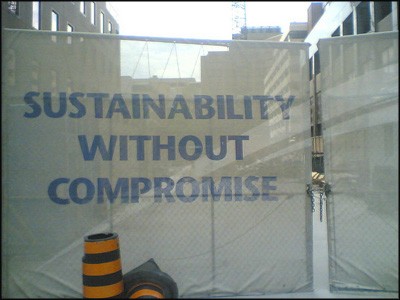Earth Day is April 22 and it’s not just for environmental writers. From solid waste to clean energy to careers and more, there’s an ecology claim to scrutinize on pretty much every business beat.
Even NASCAR, the embodiment of internal-combustion engine worship, tries an earth-friendly spin: Its Race to Green initiative is encouraging tree planting to offset carbon emissions and installing electric-vehicle charging stations at tracks, among other tactics; the Twitter handle @NASCARGreen offers up other examples like racers helping schoolkids build nesting boxes. The program bills itself as the largest sustainability program in sports and last year’s NASCAR Green Summit featured Al Gore among other environmental advocates.
If you cover the business of sports, or economic development, or anything related to large public venues like arenas and convention centers, why not check out the latest in recycling and econ-friendly initiatives at those mass gathering spots? Are they for real or just damage control to deflect attention from polluting practices?
Whatever industry you cover, there’s a green story waiting to be investigated, like hotels that “go green” by asking you to re-use towels (thus saving on their own laundry costs) . I’ve received self-congratulatory messages from a casino chain about their new “green” e-newsletter to replace a printed mailer.
If you’re in a skeptical frame of mind, you might even produce a round-up of your area’s most blatant “greenwashing” initiatives by local companies seeking green credit for shrewd business moves; you can model it after this 24/7 Wall Street feature “The Green Hypocrisy,” which exposes the polluting practices of 10 major companies that were spinning their sustainability story while in violation of EPA regulations, or actively lobbying against climate-change science, and so on.
Here, for example, is a Union of Concerned Scientists report from 2013 which claims that companies hide their climate-change denial lobbying by doing so through trade groups. Might be interesting to see the trade and lobbying group activity for or against green efforts, relative to any eco-friendly image campaigns at the corporations you cover.

And here’s a site, GreenwashingIndex.com, that lets submitters call companies on suspicious green claims in advertising. You might scope out local ads and direct-mail pieces; I’ve seen green claims lately from service firms ranging from carpet cleaners to diaper services. Some years ago a lawn-care firm near me was touting itself as “organic” — for some reason it sounded fishy and I ended up with a front-page story after learning that the state natural resources department was looking askance at that claim, because the company was using the same toxic pesticides chemicals as every other turf care business. (As a state official said to me, ‘Technically gasoline is organic, but I don’t think that’s what the consumer had in mind.’) You might do a consumer-friendly piece about how to question the green claims of companies they hire, like these consumer caveats from Environmental Protection magazine.
Even businesses can be harmed by false green claims; here’s a fascinating anecdote from the site Business Insurance about a commercial landlord who lost tenants — and whose property and financing were jeopardized — because of fake green claims by a construction firm she hired. Avoiding misleading greenwashing claims — or pursuing action against those who do — is even a bit of a legal specialty, if that’s your beat: Here is the American Bar Association’s guide to “Greenwashing: What your clients should avoid,” which outlines FTC rules and other curbs companies should beware of.
The U.S. Environmental Protection Agency’s Enforcement portal includes an interactive map of closed enforcement cases and ZIP-code searchable database that will show you any company in your area falling under EPA regulations, when they were last inspect and violation.










